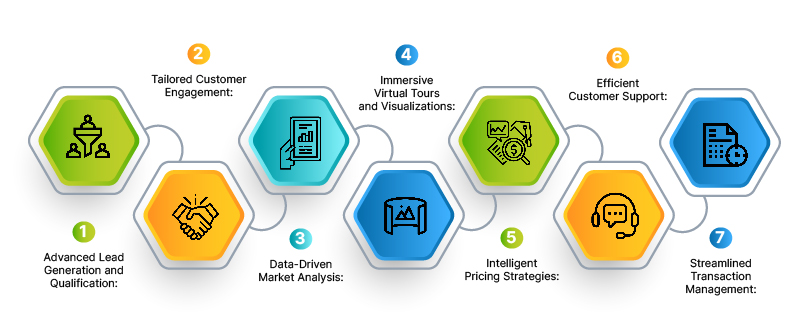What constitutes to a successful transaction in real estate? The homebuyer’s knowledge about your brand and your projects, or is their convenience and choice for a good lifestyle, or is it because of the USPs of your project? When retrospected, you will find that all these factors come down to awareness, careful consideration, and informed decision-making of the homebuyer. And all of these stages can be marked appropriately per the real estate sales funnel.
ToFu (Top of the Funnel), MoFu (Middle of the Funnel), and BoFu (Bottom of the Funnel) are the same exact stages that come forward as a powerful approach to guide potential customers from their initial awareness of your brand to their final conversion. It is a definitive sales strategy to inform, empower, and give the power of purchase into the hands of the customers.
BeyondWalls, as a leading real estate marketing agency, will delve into the ToFu, MoFu, and BoFu funnel concepts and explore how a real estate CRM can optimize this funnel. We will also discuss the vital role of metrics in real estate sales, providing a clear roadmap for monitoring and optimizing them.
Understanding ToFu, MoFu, and BoFu in Real Estate

The synergy between ToFu, MoFu, and BoFu stages forms a structured approach to engaging and nurturing potential clients, guiding them towards successful real estate sales process.
ToFu serves as the initial point of contact where potential clients first encounter a brand. In the real estate context, ToFu strategies focus on establishing your brand/new project as a trusted development by providing informative content, such as blog posts, videos, and social media updates, which educate and inspire.
MoFu is where relationships with potential clients begin to deepen. Here, the goal is to nurture leads who have shown interest in your ToFu content and guide them towards conversion. It involves segmenting leads based on their level of engagement and interest, targeting those who have taken actions such as downloading unit plans, showing interest in virtual tours, or attending real estate webinars.
Finally, BoFu marks the stage where prospects are on the verge of making significant decisions. These individuals have progressed from initial awareness to deep interest and are now actively considering specific real estate transactions. BoFu strategies are highly personalized, focusing on delivering tailored solutions, such as personalized consultations, property assessments, and detailed property showings, all aligned with the unique criteria of potential clients.
Importance of ToFu Mofu & BoFu in Real Estate Sales

Now that we have understood what these funnel stages are let’s see how their importance comes into the picture:
-
Metrics as the Foundation for Effective Strategies
Metrics are the building blocks of successful marketing strategies in real estate. They provide the insights to make informed decisions and shape your real estate marketing funnel.
-
Measuring Audience Engagement
Tracking metrics allows you to gauge how engaged your audience is with your real estate content and messaging. You can understand which messages resonate and adjust your strategy accordingly.
-
Tracking Conversions
Metrics help you keep a close eye on conversion rates, which is crucial in the real estate industry. It lets you understand what’s working and what needs improvement in your real estate sales process.
-
Optimizing ROI
By tracking metrics, you can ensure that your marketing efforts provide a positive return on investment (ROI). Real estate is a competitive field, and knowing that your efforts are generating a good return is essential.
Tracking Metrics at Each Funnel Stage
The following metrics form the basis of each of the stages:
-
Top of Funnel Metrics
Monitoring metrics at the Top of the Funnel stage involves tracking website traffic, social media reach, and content engagement. These metrics help you assess the awareness stage and refine your approach. High website traffic, a broad social media reach, and increased content engagement indicate successful ToFu strategies.
-
Middle of Funnel Metrics
In the Middle of Funnel, key metrics include lead generation, email open rates, and content downloads. These metrics reflect how effectively you’re nurturing leads and guiding them toward a decision. High lead generation, strong email open rates, and frequent content downloads suggest that your MoFu strategies are effective.
-
Bottom of Funnel Metrics
At the Bottom of the Funnel, pay close attention to metrics like conversion rates, closing ratios, and customer feedback. These metrics are crucial in understanding how well you’re closing real estate deals and providing an excellent customer experience. High conversion rates, favourable closing ratios, and positive customer feedback indicate successful BoFu strategies.
How to Effectively Track Metrics

Here’s how you can effectively track metrics in each of the stages.
-
Choosing the Right Tools
Invest in a real estate CRM such as Sell.do to track and analyse metrics effectively. These tools can provide the data you need to understand your real estate audience and make informed decisions.
-
Data Collection and Management
Ensure that data collection is accurate, and that data is managed efficiently. Inaccurate data can lead to flawed insights, so it’s important to establish data collection procedures that are thorough and reliable.
-
Data Analysis and Interpretation
Collecting data is just the first step. It’s equally important to analyse the data you collect and derive actionable insights. Data analysis provides the foundation for making informed decisions and optimizing real estate marketing funnel.
Implementing ToFu, MoFu, BoFu Strategies

The following are the steps to quickly form your funnel strategy.
-
Top of the Funnel Strategies
- Create engaging blog and ad content that resonates with your target real estate audience. Your content can serve as a valuable source of information for potential clients.
- Utilize social media effectively to increase your reach and engagement. Share relevant real estate content and engage with your audience.
- Optimize your website for search engines. Make sure your real estate website is easily discoverable by people searching for real estate services in your area.
-
Middle of the Funnel Strategies
- Implement real estate lead nurturing through email marketing. Use personalized email campaigns to keep potential real estate clients engaged and informed.
- Offer valuable resources such as unit plans, brochures, payment plans, guides, and webinars to address the specific needs of your real estate audience.
- Utilize targeted advertising to reach out to leads and guide them toward conversion. Targeted ads can help keep your real estate brand top-of-mind.
-
Bottom of the Funnel Strategies
- Offer personalized consultations to real estate clients who are ready to decide. Personalized advice and assistance can be the final push needed to close a deal.
- Understand the concerns potential real estate clients may have and provide clear, reassuring answers.
- Provide exceptional customer service throughout the real estate transaction. Delight your clients with a smooth, hassle-free experience.
Conclusion
ToFu, MoFu, and BoFu play a pivotal role in the success of real estate marketing & sales. They help in understanding the customer journey and tailoring marketing efforts accordingly. The significance of tracking metrics cannot be understated, as they provide the insights and data-driven decision-making necessary for success in the dynamic world of real estate. By following these strategies and paying close attention to the right metrics, developers and brokers can achieve optimal results and elevate their real estate marketing & sales pipelines.



















































